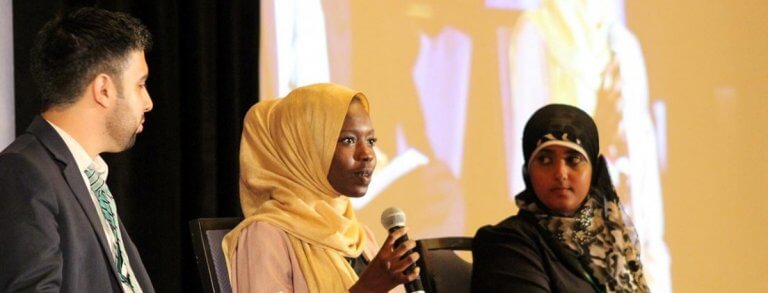
It’s no secret that Islamophobia is well and alive in America. With Donald Trump in the White House, studies have shown how hate crime numbers in 2015 and 2016 have skyrocketed and how assaults on Muslims have surpassed post-9/11 levels.
Muslim students on US campuses have reason to worry how their faith will affect their academic studies and life on campus. Negative attitudes, ranging from blatant Islamophobia to microagressions – such as stares in public, alienation and assumptions of religious homogeneity – have been reported to be perpetrated by a significant portion of society.
This is the environment in which Muslim student groups in US campuses now operate. The Muslim Student Association (MSA) “strives to facilitate networking, educating, and empowering the students of today to be citizens of tomorrow’s community” according to its website.
Today's the last day of Islam Awareness Week at Carleton University. Head to the campus towards the University Center on the 4th floor. You can't miss the biggest club event of the year. Stop by to learn about Islam, enjoy the attractions, food, and good company. @CarletonMSA pic.twitter.com/mduAx9HIso
— SomaliEducationFund (@somedufund) March 23, 2018
Shafeen Pittal, the vice president of the MSA at University of California, San Diego describes it as a “community that holistically caters to as many Muslim students as possible”.
“We are trying to institutionalize the Muslim student experience on campus, whether that’s by reaching out to the administration and asking for resources we may need, or having events that may provide spiritual, academic, or social help, or just making sure that the Muslim students have a support system and community on campus,” the political science major said.
Events include the annual Justice in Palestine Week and Islam Awareness Week – both of which aim to educate other students about the many misconceptions about Islam. They also organise protest and demonstrations to fight for social justice, as UCSD Guardian noted.
Many mistakenly associate with Islam with terrorism, Shafeen said, thanks to how Muslims are regularly portrayed in Western media. The word “jihad” are also misinterpreted to mean “holy war” or a sanction for violence, when its actual meaning is “struggle,” defined by the Quran as a struggle to be a better person and a better Muslim.
To counter this rising tide of racist speech and action, Muslim student groups throughout the country have been holding informative events regularly. For example, during the recent Islamic Awareness Week, the Muslim Student Association at the University of Maryland held events from letting students of other faith try on hijabs to sharing falafels to show a taste of Ramadan.
https://twitter.com/BrianRodgersIII/status/689532760432648192
“If you are unaware of our beliefs and why we practice the way we practice, it’s very easy to form this negative idea about is and we want to clear that up to decrease discrimination, to decrease any judgment for Muslims not just on this campus, but for Muslims anywhere around the world,” said UMD student Ayah Avuserrieh.
At the University of Nebraska-Lincoln, fundraising and forums were held so students could learn more about Islamic and Arabic culture, such as Arabic desserts to how Islam views marriage and relationships, Daily Nebraskan reported.
The Islamic Awareness Week is in reposnse to the negative attitude observed at UNL and in the United States, according to Mohamed Aly, secretary for MSA.
“We’re not going to stand still against this hate,” he said.
“We’re going to reply with awareness and peace. We will spread love and apply Islam to prevent the hate.”
Liked this? Then you’ll love these…
How Islamophobia haunts Southeast Asian Muslim students in the UK







